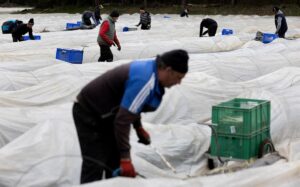
Canada has announced new regulations to reduce the number of temporary foreign workers allowed into the country, signaling a shift in its immigration policy following a surge in population growth and rising unemployment. The new rules, revealed on Monday, include reinstating a ban on issuing temporary foreign worker permits for low-wage positions in cities with an unemployment rate of 6% or higher.
Canada has recently experienced its highest population growth in over 50 years, driven largely by immigration. However, as the population surpassed 40 million, unemployment also saw a rise, prompting the government to reassess its immigration strategies.
Immigration Minister Marc Miller emphasized the need for migration policies that align with the current economic conditions in Canada and the tightening job market. “We won’t hesitate to take additional measures if necessary,” Miller stated at a news conference.
As part of the revised immigration approach, Canada will permit 65,000 fewer temporary foreign workers annually. This follows a cap on temporary migrants introduced in March, which reduced their share of the population from 6.2% to 5%.
The decision marks a shift from the previous expansion of the temporary foreign worker program, which was almost doubled to help businesses address labor shortages following the lifting of COVID-19 restrictions. The program, initially focused on the agricultural sector, had been broadened to include industries such as fast food. However, the recent rise in unemployment to 6.4% and the increased strain on housing and social services have led to a reconsideration of the program’s scope.
Jobs Minister Randy Boissonnault highlighted the need to ensure job access for Canadians and to prevent abuses within the temporary foreign worker program. Under the new rules, permits for low-wage jobs will be valid for only one year, reduced from the previous two years, and the maximum share of temporary foreign workers that an employer can hire will revert to the pre-pandemic level of 10%, down from 20%. Sectors such as agriculture, healthcare, and construction will be exempt from these changes.
Additionally, in January, Ottawa announced a cap on international students, suggesting the program was being used as an alternative pathway for immigration.
These new temporary foreign worker rules will come into effect on September 26.





















Comments are closed for this article!